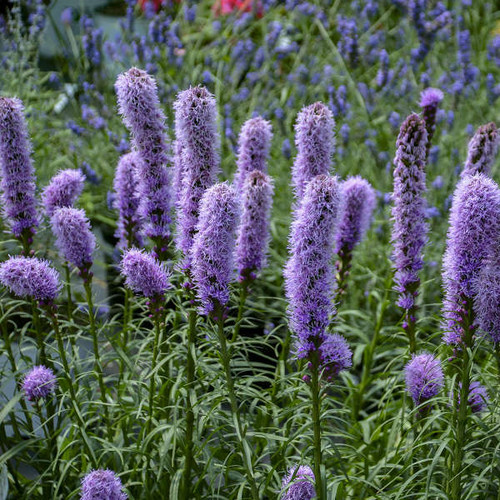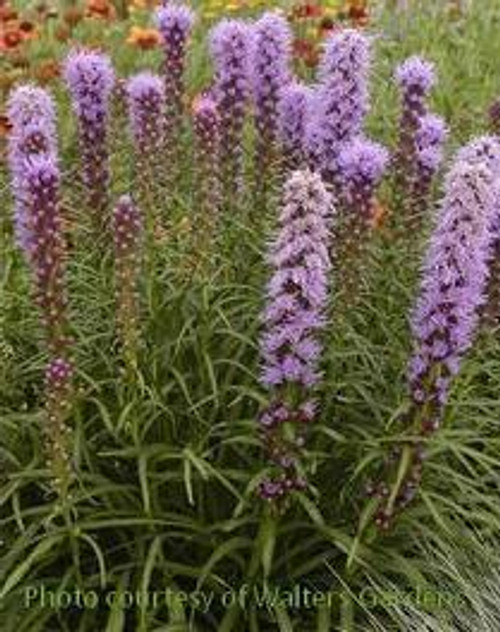Product Description
Liatris spicata 'Kobold' Seed Form (25) Bare Root Plants
Common name: gayfeather, blazing star, dense blazing star or marsh blazing star.
Bright, rosy lavender flower wands open from top to bottom in early summer, appearing to glow at the tips. Narrow, opposite leaves are up to 10 inches long at the base of the plant and decrease in length up the stems.
In all, Liatris is a very strong vertical accent and 'Kobold' is one of the best selections available for border gardens. It is a staple item for cutting gardens; it adds a bright, vertical element to bouquets.
Height: 18.0-30.0 Inches
Spread: 12.0-16.0 Inches
Hardiness Zones: 3,4,5,6,7,8,9
Flower Color: Pink shades, Purple shades
Foliage Color: Green shades
Full Sun (> 6 hrs. Direct Sun)
Average Water Needs
Poor to Fertile Soil Quality
Bloomtime: Early Summer - Midsummer
Attracts Butterflies
Bee Friendly
Deer Resistant
Seasonal Interest: Dried Seed Heads
Growth Rate: Medium
Border Plant, Cut Flower, Cut Foliage, Dried Flower, Mass Planting
Liatris spicata 'Kobold' is a popular variety of blazing star known for its compact size and vibrant purple flowers. Unlike 'Kobold Original,' which is vegetatively propagated to ensure consistent height, 'Kobold' is typically grown from seed, leading to some variation in its characteristics. Here is what you need to know about the seed form of 'Kobold':
Appearance:
- Rosy-Lavender Flowers: 'Kobold' seed strain typically produces flower spikes with rosy-lavender blossoms. However, due to its seed propagation, there can be slight variations in the shade of purple.
- Grass-Like Foliage: The flowers emerge from clumps of grass-like, medium green leaves, adding a textural element to the garden.
- Variable Height: While 'Kobold Original' is known for its compact size, the seed-grown 'Kobold' can exhibit some variation in height, typically ranging from 18 to 30 inches tall.
Growing Conditions:
- Sunlight: Thrives in full sun (at least 6 hours of direct sunlight per day).
- Soil: Prefers moist, well-drained soil. It's somewhat tolerant of poor soils but performs best in fertile conditions.
- Hardiness Zones: Suitable for USDA hardiness zones 3-9, making it a versatile choice for a wide range of climates.
Growing from Seed:
- Sowing: Seeds can be sown directly in the garden in spring or started indoors 6-8 weeks before the last frost.
- Germination: Liatris seeds require light to germinate, so sow them on the surface of the soil and press them in lightly.
- Cold Stratification: Cold stratification can improve germination rates. You can achieve this by chilling the seeds in the refrigerator for a few weeks before sowing.
Care:
- Watering: Water regularly, especially during dry periods, to keep the soil moist.
- Deadheading: Deadheading spent flowers can encourage additional blooms and prevent self-seeding.
- Staking: Taller plants may require staking to prevent them from flopping over, especially in windy conditions.
Uses:
Similar to 'Kobold Original', the seed form of 'Kobold' is well-suited for:
- Borders: Adds vertical interest and a pop of color to borders and beds.
- Meadow Gardens: Creates a beautiful display when planted in groups in meadow gardens or naturalized areas.
- Cut Flowers: The long-lasting flower spikes are excellent for cutting and using in fresh or dried arrangements.
- Pollinator Gardens: The flowers attract butterflies, bees, and other pollinators.
Key Differences from 'Kobold Original':
- Height Variation: The seed strain can have more variation in height compared to the consistently compact 'Kobold Original'.
- Color Variation: There might be slight variations in the shade of purple in the flowers due to seed propagation.
If you are looking for a colorful and attractive perennial with tall, purple flower spikes and do not mind some variation in height and color, Liatris spicata 'Kobold' seed form is a great option. It is a versatile plant that will bring beauty and pollinator activity to your garden.
Other Details
The most important part of the plant is its root system. Healthy roots are the foundation of a healthy, vibrant plant. The type of plug container used is based on the specific needs of the plants. Perennials offered as bare root traditionally perform better when planted as bare root.Planted in a specialized mix, potted plants have well established root systems. Top growth stage will vary depending on the current life cycle and time of year when shipped. In Winter and early Spring dormant plants may be shipped. Dormant plants may be planted right away, even before the last frost date.
Most bare root varieties are field grown for at least one season, though Hemerocallis and Hosta are grown for two seasons. The bulk of the soil is removed during the harvesting process and the tops of most varieties are trimmed back to the crown. They are graded, packed in shredded aspen or sphagnum moss and stored in freezers until ready to be shipped.
See our Container Sizes and Bare Root Perennials pages for more information.
Plant information and care is provided in the Overview section, Plant Genus Page and general information is provided in the Planting Care & Guides. Additional questions can be asked on each Plant page.
Plant Spacing: Using the maximum mature spread or width of a plant to guide spacing, ensures space to grow to full size. To fill an area sooner, plant them closer together. Just remember, future thinning or transplanting may be needed.
Water: Keep a close eye on newly planted perennials, especially throughout the first growing year. Most early plant loss is due to too much or too little water!














